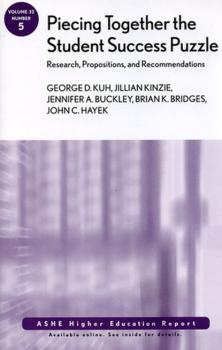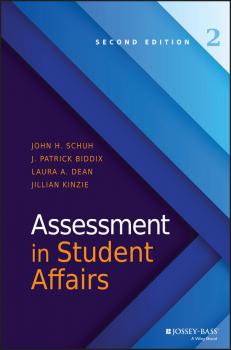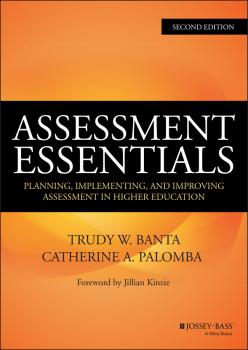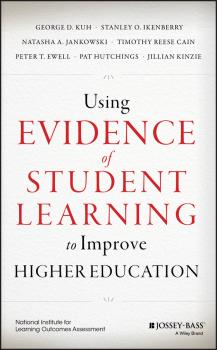ТОП просматриваемых книг сайта:
Jillian Kinzie
Список книг автора Jillian KinziePiecing Together the Student Success Puzzle: Research, Propositions, and Recommendations - Jillian Kinzie
Аннотация
Creating the conditions that foster student success in college has never been more important. As many as four-fifths of high school graduates need some form of postsecondary education to be economically self-sufficient and manage the increasingly complex social, political, and cultural issues of the 21st century. But about 40 percent of those who start college fail to earn a degree within 6 or 8 years, an unacceptably low number. This report examines the complicated array of social, economic, cultural and educational factors related to student success in college, defined as academic achievement, engagement in educationally purposeful activities, satisfaction, acquisition of desired knowledge, skills and competencies, persistence, and attainment of educational objectives. Although the trajectory for academic success in college is established long before students matriculate, most institutions can do more than they are at present to shape how students prepared for college and they they engage in productive activities after they arrive. This is the 5th issue of the 32nd volume of the Jossey-Bass series ASHE Higher Education Report. Each monograph is the definitive analysis of a tough higher education problem, based on thorough research of pertinent literature and institutional experiences. Topics are identified by a national survey. Noted practitioners and scholars are then commissioned to write the reports, with experts providing critical reviews of each manuscript before publication.
Аннотация
A practical, comprehensive manual for assessment design and implementation Assessment in Student Affairs, Second Edition offers a contemporary look at the foundational elements and practical application of assessment in student affairs. Higher education administration is increasingly called upon to demonstrate organizational effectiveness and engage in continuous improvement based on information generated through systematic inquiry. This book provides a thorough primer on all stages of the assessment process. From planning to reporting and beyond, you'll find valuable assessment strategies to help you produce meaningful information and improve your program. Combining and updating the thoroughness and practicality of Assessment in Student Affairs and Assessment Practice in Student Affairs, this new edition covers design of assessment projects, ethical practice, student learning outcomes, data collection and analysis methods, report writing, and strategies to implement change based on assessment results. Case studies demonstrate real-world application to help you clearly see how these ideas are used effectively every day, and end-of-chapter discussion questions stimulate deeper investigation and further thinking about the ideas discussed. The instructor resources will help you seamlessly integrate this new resource into existing graduate-level courses. Student affairs administrators understand the importance of assessment, but many can benefit from additional direction when it comes to designing and implementing evaluations that produce truly useful information. This book provides field-tested approaches to assessment, giving you a comprehensive how-to manual for demonstrating—and improving—the work you do every day. Build your own assessment to demonstrate organizational effectiveness Utilize quantitative and qualitative techniques and data Identify metrics and methods for measuring student learning Report and implement assessment findings effectively Accountability and effectiveness are the hallmarks of higher education administration today, and they are becoming the metrics by which programs and services are evaluated. Strong assessment skills have never been more important. Assessment in Student Affairs gives you the knowledge base and skill set you need to shine a spotlight on what you and your organization are able to achieve.
Assessment Essentials. Planning, Implementing, and Improving Assessment in Higher Education - Jillian Kinzie
Аннотация
A comprehensive expansion to the essential higher education assessment text This second edition of Assessment Essentials updates the bestselling first edition, the go-to resource on outcomes assessment in higher education. In this thoroughly revised edition, you will find, in a familiar framework, nearly all new material, examples from more than 100 campuses, and indispensable descriptions of direct and indirect assessment methods that have helped to educate faculty, staff, and students about assessment. Outcomes assessment is of increasing importance in higher education, especially as new technologies and policy proposals spotlight performance-based success measures. Leading authorities Trudy Banta and Catherine Palomba draw on research, standards, and best practices to address the timeless and timeliest issues in higher education accountability. New topics include: Using electronic portfolios in assessment Rubrics and course-embedded assessment Assessment in student affairs Assessing institutional effectiveness As always, the step-by-step approach of Assessment Essentials will guide you through the process of developing an assessment program, from the research and planning phase to implementation and beyond, with more than 100 examples along the way. Assessment data are increasingly being used to guide everything from funding to hiring to curriculum decisions, and all faculty and staff will need to know how to use them effectively. Perfect for anyone new to the assessment process, as well as for the growing number of assessment professionals, this expanded edition of Assessment Essentials will be an essential resource on every college campus.
Аннотация
American higher education needs a major reframing of student learning outcomes assessment Dynamic changes are underway in American higher education. New providers, emerging technologies, cost concerns, student debt, and nagging doubts about quality all call out the need for institutions to show evidence of student learning. From scholars at the National Institute for Learning Outcomes Assessment (NILOA), Using Evidence of Student Learning to Improve Higher Education presents a reframed conception and approach to student learning outcomes assessment. The authors explain why it is counterproductive to view collecting and using evidence of student accomplishment as primarily a compliance activity. Today's circumstances demand a fresh and more strategic approach to the processes by which evidence about student learning is obtained and used to inform efforts to improve teaching, learning, and decision-making. Whether you're in the classroom, an administrative office, or on an assessment committee, data about what students know and are able to do are critical for guiding changes that are needed in institutional policies and practices to improve student learning and success. Use this book to: Understand how and why student learning outcomes assessment can enhance student accomplishment and increase institutional effectiveness Shift the view of assessment from being externally driven to internally motivated Learn how assessment results can help inform decision-making Use assessment data to manage change and improve student success Gauging student learning is necessary if institutions are to prepare students to meet the 21st century needs of employers and live an economically independent, civically responsible life. For assessment professionals and educational leaders, Using Evidence of Student Learning to Improve Higher Education offers both a compelling rationale and practical advice for making student learning outcomes assessment more effective and efficient.




